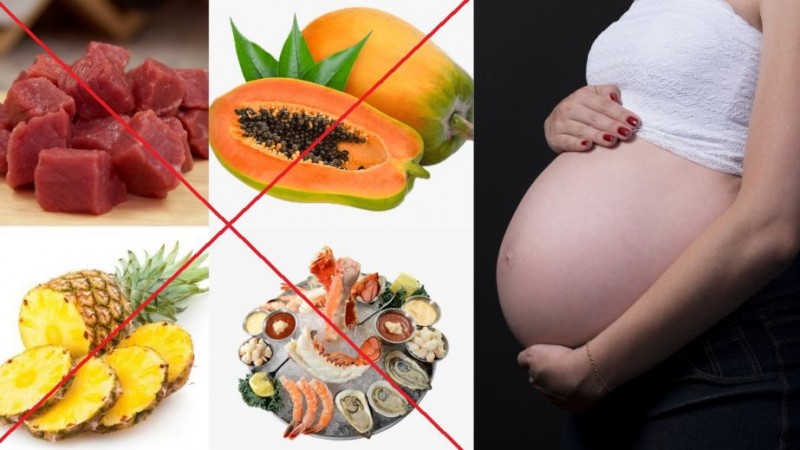
Pregnancy is a remarkable and transformative period in a woman's life, filled with anticipation and excitement. During this crucial time, maintaining a healthy diet is of paramount importance, as it directly impacts both the mother's well-being and the development of the growing baby. While proper nutrition is essential, there are certain foods that should be avoided during pregnancy to ensure the well-being of both mother and child. This article will delve into the reasons behind these dietary restrictions and provide insights into the potential risks associated with consuming these foods.
The Significance of a Balanced Diet During Pregnancy
A balanced and nutritious diet is a cornerstone of a healthy pregnancy. Proper nutrition supports the rapid growth and development of the fetus, helps prevent pregnancy complications, and aids the mother's overall well-being. Key nutrients such as folic acid, iron, calcium, and protein play crucial roles in fetal development, maternal health, and the prevention of birth defects. A balanced diet also helps control maternal weight gain and reduces the risk of gestational diabetes and hypertension.
Foods to Avoid
While there are numerous foods that contribute positively to a healthy pregnancy, there are several that should be avoided due to potential risks they pose to the developing baby and the mother's health. These foods include:
1. Raw or Undercooked Seafood and Eggs:
Raw or undercooked seafood, such as sushi and certain types of shellfish, can expose the mother and fetus to harmful bacteria, viruses, and parasites. Similarly, undercooked eggs can carry the risk of Salmonella infection. To eliminate these risks, it's advisable to consume fully cooked seafood and eggs during pregnancy.
2. High-Mercury Fish:
Certain fish, such as shark, swordfish, king mackerel, and tilefish, are known to contain high levels of mercury, which can negatively affect the baby's developing nervous system. Opt for low-mercury fish like salmon, trout, and sardines, which provide essential omega-3 fatty acids without the mercury concerns.
3. Unpasteurized Dairy Products:
Unpasteurized dairy products can harbor harmful bacteria such as Listeria, which can lead to serious health complications for both the mother and the baby. Choosing pasteurized dairy products ensures the elimination of these risks while still benefiting from valuable nutrients like calcium and vitamin D.
4. Deli Meats and Processed Foods:
Deli meats and processed foods are often linked to a higher risk of foodborne illnesses due to potential bacterial contamination. These foods should be consumed cautiously, and if chosen, they should be heated to a safe temperature before consumption to minimize risks.
5. High-Caffeine Beverages:
Excessive caffeine intake during pregnancy has been associated with an increased risk of miscarriage and low birth weight. While moderate caffeine consumption is generally considered safe, it's advisable to limit intake and opt for decaffeinated beverages when possible.
6. Artificial Sweeteners:
Some artificial sweeteners, such as saccharin and aspartame, may not be completely safe during pregnancy. While the research is not definitive, it's recommended to minimize consumption of foods and beverages containing these sweeteners.
7. Unwashed Produce:
Consuming unwashed fruits and vegetables can expose pregnant women to harmful bacteria and pesticides. Thoroughly washing and properly preparing produce can significantly reduce these risks.
8. Alcohol:
Alcohol consumption during pregnancy has been linked to a range of birth defects and developmental issues. To ensure the health of the developing fetus, it's advisable to abstain from alcohol throughout pregnancy.
9. Excessive Vitamin A:
While vitamin A is essential for fetal development, excessive intake can lead to birth defects. Avoid consuming high-dose vitamin A supplements and focus on obtaining this nutrient from natural sources like fruits and vegetables.
10. Raw Sprouts:
Raw sprouts, including alfalfa, clover, and radish sprouts, can carry a risk of bacterial contamination. Cooking sprouts thoroughly before consumption can mitigate this risk.
Maintaining a healthy and balanced diet during pregnancy is a critical step toward ensuring the well-being of both the mother and the developing baby. Avoiding certain foods that carry potential risks, such as raw or undercooked seafood, high-mercury fish, unpasteurized dairy products, and deli meats, can help mitigate the chances of foodborne illnesses and other complications. By making informed dietary choices, expectant mothers can provide their babies with the best possible start in life while safeguarding their own health throughout this transformative journey. It's essential to consult with healthcare professionals to create a personalized dietary plan that addresses individual nutritional needs and preferences.
Heart Attack or Panic Attack, Which is More Dangerous?